Tests and Diagnosis for Erectile Dysfunction: What to Expect
Written by Dr. Sharon Kumar

With a strong academic background in dentistry and clinical exposure, Dr. Sharon who has studied at PDM Dental College, brings a valuable blend of medical knowledge and communication skills to health content writing. She is passionate about creating clear, compassionate, and evidence-based content on topics such as general wellness, sexual health, oral care, and patient education. Her goal is to make complex medical information easy to understand, relatable, and genuinely helpful for readers seeking clarity on their health concerns. Dr. Sharon believes in the power of well-researched, empathetic content to educate and empower people to make better health decisions. Whether it’s writing about preventive care or breaking down myths in sexual wellness, her content always balances science with sensitivity.
•
July 7, 2025
Our experts continually monitor the health and wellness space, and we update our articles when new information becomes available.
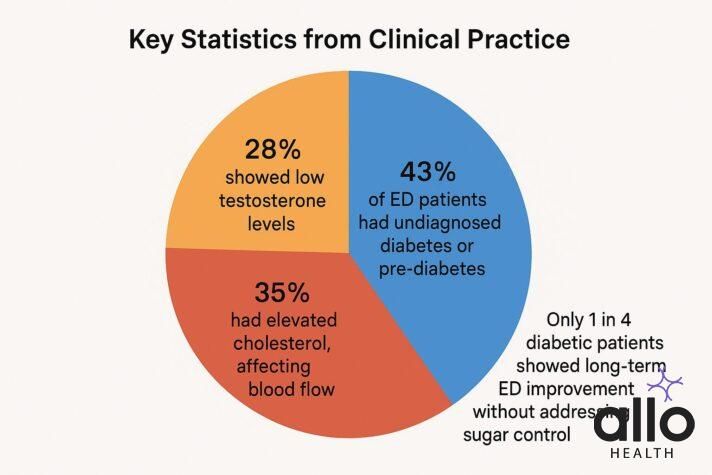
Quick Read
An erectile dysfunction (ED) test is a set of medical evaluations used to determine the underlying cause of difficulty achieving or maintaining an erection. The process usually starts with a detailed medical history and physical exam, followed by blood tests to check for issues like low testosterone, diabetes, high cholesterol, or thyroid imbalances. In some cases, doctors may assess psychological factors such as stress, anxiety, or depression that can impact sexual performance. More advanced tests like penile Doppler ultrasound evaluate blood flow to the penis, while nighttime erection tests (nocturnal penile tumescence) help distinguish between physical and psychological causes. These tests are generally quick, painless, and crucial for identifying the most effective treatment options tailored to your needs.
Erectile dysfunction (ED) is one of the most common men's health issues, affecting millions of men worldwide. Yet many men feel hesitant or unsure about seeing a doctor, and that’s completely understandable. Understanding the erectile dysfunction test procedures can give you the confidence to take the first step toward a better sex life and overall health. An erectile dysfunction test involves various evaluations to identify the root cause of ED. These tests examine both physical and psychological factors. Blood tests check hormone levels and overall health, as they can affect erectile function. Specialized tests evaluate blood flow to the penis since healthy blood flow is directly linked to the ability to achieve and maintain an erection. This guide will explain what to expect during erectile dysfunction testing. From basic blood work to advanced diagnostic procedures, you’ll learn about the different test types and how they help doctors create effective treatment plans.
How Erections Work and Why Testing Matters for Erectile Dysfunction
An erection happens when the brain, nerves, blood vessels, and hormones all work together in response to sexual arousal. It starts with stimulation, whether from touch, thoughts, or emotions, which signals the nervous system to release nitric oxide[1]. This chemical causes the smooth muscles in the corpora cavernosa (the sponge-like chambers in the penis) to relax. As a result, blood flows into these chambers, increasing pressure and causing the penis to become firm.
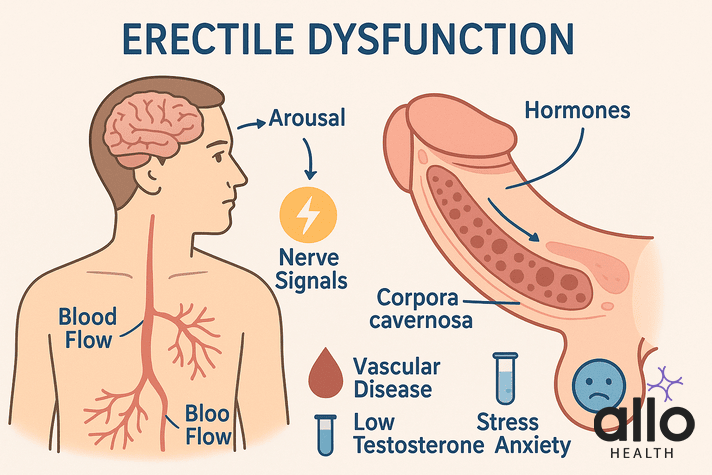
For this process to work correctly, your blood vessels must allow proper circulation, and your nerves must effectively carry arousal signals. If there's a problem at any step, such as poor blood flow due to heart disease or diabetes, low testosterone levels, or nerve damage, it can disrupt erections. Mental health issues like stress or anxiety can also interfere with the brain’s ability to trigger arousal.
That’s why testing for erectile dysfunction often includes blood tests, hormone panels, and sometimes imaging or psychological evaluation. These tests help identify whether the cause is physical, hormonal, psychological, or a combination, which is essential for choosing the right treatment.
Step 1: Medical History and Physical Exam
Your doctor starts with a complete medical history [2]. They ask about your overall health and lifestyle choices. Sexual history questions help identify the causes. This includes discussing relationships with sexual partners.
The physical exam checks for signs of underlying health problems. Your doctor measures blood pressure and pulse rate. They examine the penis and surrounding areas. This helps identify physical abnormalities that might cause erectile dysfunction.

Step 2: Blood Tests for Erectile Dysfunction
Blood tests [3] reveal important information about your health, including complete blood count (CBC). These lab tests check for diabetes, heart disease, and hormone problems.
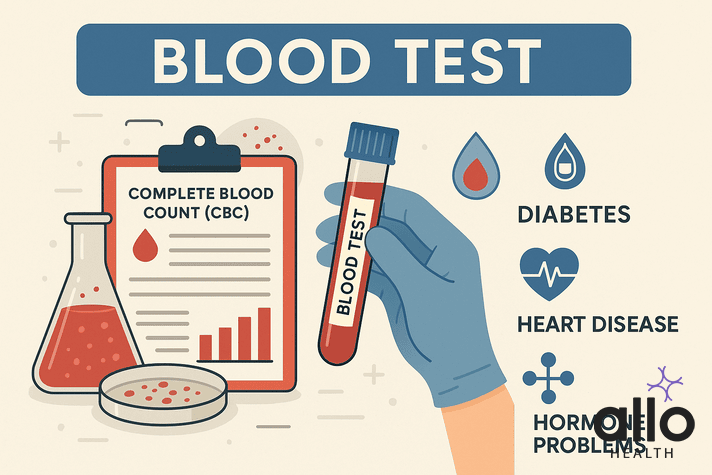
Low testosterone levels often contribute to erectile dysfunction. Testosterone controls erection as it is the most important male sex hormone. The central nervous system controls testosterone secretion. Hormonal problems may lead to erectile dysfunction.
A simple blood test can reveal a lot more than just numbers; it can help us uncover the root cause of your erection problems, whether it's low testosterone, diabetes, or something else entirely."
Peyronie's disease causes scar tissue in deeper penis tissues. This results in curved, painful erections. Doctors often associate this condition with erectile dysfunction, so evaluating ED risk factors and hormone levels becomes necessary.
Thyroid function tests [4] check for hormonal imbalances. Common blood tests include fasting glucose levels and cholesterol profiles. These tests help identify conditions that affect blood flow. Your doctor may order additional lab tests based on your symptoms.
Key Statistics from Clinical Practice:
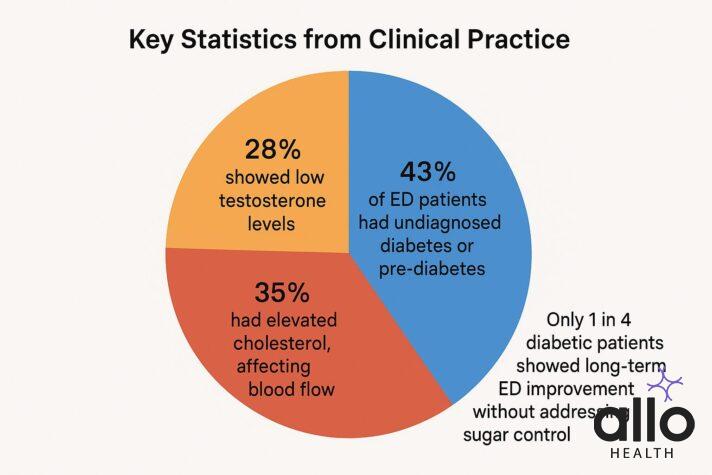
Step 3: Psychological Evaluation
Mental health plays a major role in erectile function. Stress, anxiety, and depression can all cause erection problems. Your doctor asks about psychological issues that might contribute to erectile dysfunction.
Sometimes psychological factors combine with physical problems. This creates a cycle where anxiety makes physical symptoms worse. Professional counseling can help address these psychological aspects.
Clinical Observations:
- 38% of ED patients never spoke to their partners about it
- 24% had performance anxiety as the main trigger
- 62% of those under 35 with ED had anxiety-related symptoms as the root cause
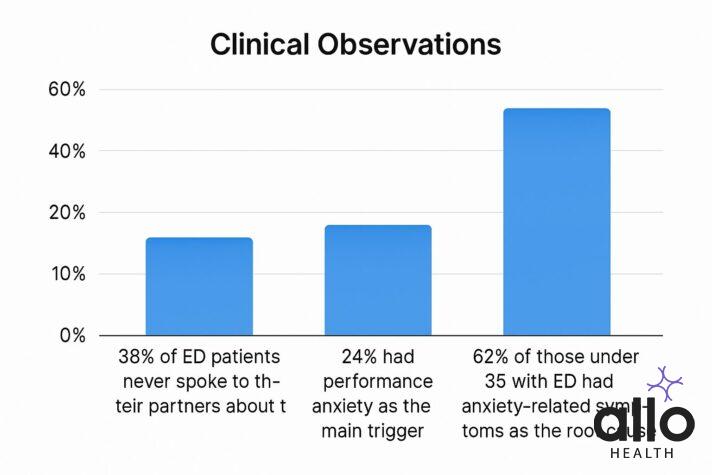
Step 4: Specialized Diagnostic Tests
Penile Doppler Ultrasound
- This erectile dysfunction test uses ultrasound imaging to check blood flow in the penis. The procedure involves applying gel and using sound waves to monitor blood circulation. A penile doppler test [5] without injection can show basic blood flow patterns.
- Sometimes doctors use intracavernosal injections to induce an erection during testing. This intracavernosal injection test shows how well blood vessels respond to medication. The test helps identify vascular problems that cause erectile dysfunction.
- Don’t worry, this test is painless and done in a calm setting.
Nocturnal Penile Tumescence Test
- The nocturnal penile tumescence test [6] monitors erections during sleep. Healthy men have several erections throughout the night. This nocturnal erection test uses devices like penile cuffs or snap gauge systems.
- The test helps distinguish between physical and psychological causes. If you have normal nighttime erections, psychological factors might be the main issue. Poor nighttime erections suggest physical problems.
Additional Testing Options
Some doctors recommend an erection self-test you can do at home. Clinical trials continue to develop new diagnostic methods. These studies help improve testing accuracy and patient comfort.
Step 5: Treatment Options Based on Test Results
Physical Causes
Treatment depends on what tests reveal. Medications like Viagra help improve blood flow. Lifestyle changes include a better diet and regular exercise. Some men benefit from shockwave therapy or stem cell therapy.
Mechanical devices like vacuum erection devices or penis pumps provide another option. Severe cases might need penile implants or other surgical procedures. Each treatment has potential side effects to consider.
Psychological Causes
Psychological erectile dysfunction often responds well to counseling. Therapy helps address anxiety, depression, and relationship issues. Working with sexual partners improves overall treatment success.
Stress management techniques reduce performance anxiety. Some men need treatment for underlying mental health conditions. Combining psychological and medical treatments often works best.
Emerging Treatments
New treatments continue to develop through clinical trials. Platelet-rich plasma therapy shows promise for some patients. Researchers study how different approaches affect the nervous system.
These innovative treatments may help men who don't respond to traditional methods. Your doctor can discuss whether you qualify for experimental treatments.
Case Study: Comprehensive ED Treatment
A 34-year-old man experienced erection problems for 8 months. He worked long hours at a stressful job and didn't exercise much.
Test Results
Blood tests showed slightly low testosterone and high stress hormones.
Treatment
Stress management, increased exercise, better sleep, partner communication, and short-term medication.
Results
After 3 months, his erection problems improved by 75%. He felt better about sex, his relationship improved, and he no longer needed medication.
Conclusion
Proper testing first leads to 60% better results than skipping the diagnostic phase.
What to Expect During Testing
Most erectile dysfunction tests are quick and painless. Blood tests take just a few minutes. Ultrasound examinations use external devices that don't cause discomfort.
Doctors maintain professionalism and respect your privacy. Many practices offer discreet delivery of information and test results. The goal is to find the best treatment for your specific situation. Accurate diagnosis leads to more effective treatment plans.
Conclusion
Erectile dysfunction testing helps doctors find the right treatment for your needs. From basic blood tests to advanced procedures like penile doppler ultrasound, multiple diagnostic tools are available. Understanding what each test involves reduces anxiety about the process. Modern medicine offers many effective treatments for erectile dysfunction ED. Whether your condition stems from physical problems, psychological factors, or both, help is available. If ED is affecting your quality of life, know that you’re not alone and help is available. Taking the first step to get tested shows you're taking charge of your health. With proper diagnosis and treatment, most men can return to normal sexual function.
Disclaimer
The following blog article provides general information and insights on various topics. However, it is important to note that the information presented is not intended as professional advice in any specific field or area. The content of this blog is for general educational and informational purposes only. The content should not be interpreted as endorsement, recommendation, or guarantee of any product, service, or information mentioned. Readers are solely responsible for the decisions and actions they take based on the information provided in this blog. It is essential to exercise individual judgment, critical thinking, and personal responsibility when applying or implementing any information or suggestions discussed in the blog.
Most Asked Questions
How accurate are erectile dysfunction tests?
Erectile dysfunction tests are highly accurate when performed correctly. A combination of blood tests, ultrasounds, and psychological evaluations helps doctors get a comprehensive view of the condition, leading to effective treatment plans.
Can I resume normal sexual activity after treatment?
Yes, many men experience improvements in erectile function with the right treatment plan. Your doctor will guide you on when it’s safe to resume sexual activity, depending on the treatment used.
How long do erectile dysfunction tests take?
Most tests, such as blood work and ultrasound, are quick and non-invasive. Blood tests usually take only a few minutes, while ultrasound exams are simple and painless.
What is the nocturnal penile tumescence test, and how does it help?
This test monitors spontaneous erections during sleep. If you have normal nighttime erections, it may suggest the problem is psychological. If not, further tests may be needed to look into physical causes.
How do blood tests help diagnose erectile dysfunction?
Blood tests can detect underlying conditions like diabetes, low testosterone, and high cholesterol, which are common causes of erectile dysfunction. They give doctors critical insights into your overall health.
Is a psychological evaluation necessary for erectile dysfunction?
Yes, stress, anxiety, and depression can all contribute to erectile dysfunction. A psychological evaluation helps determine if these factors are affecting your sexual health, and therapy can help address these concerns.


